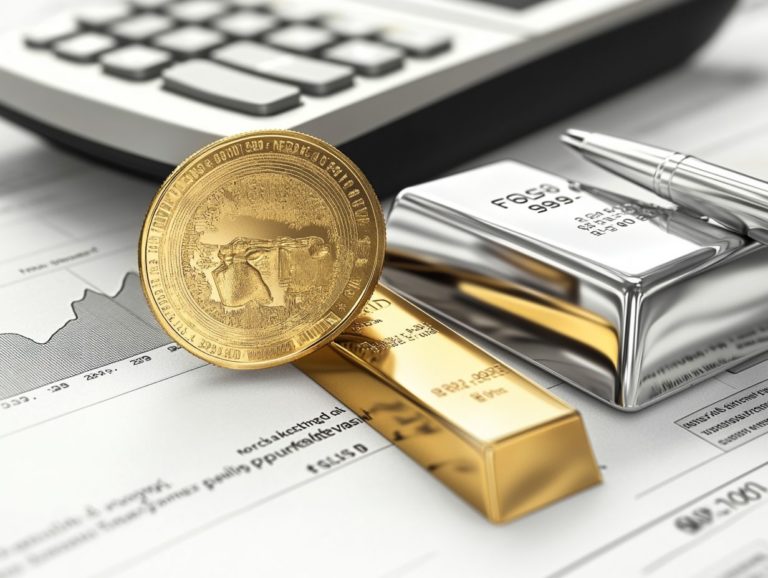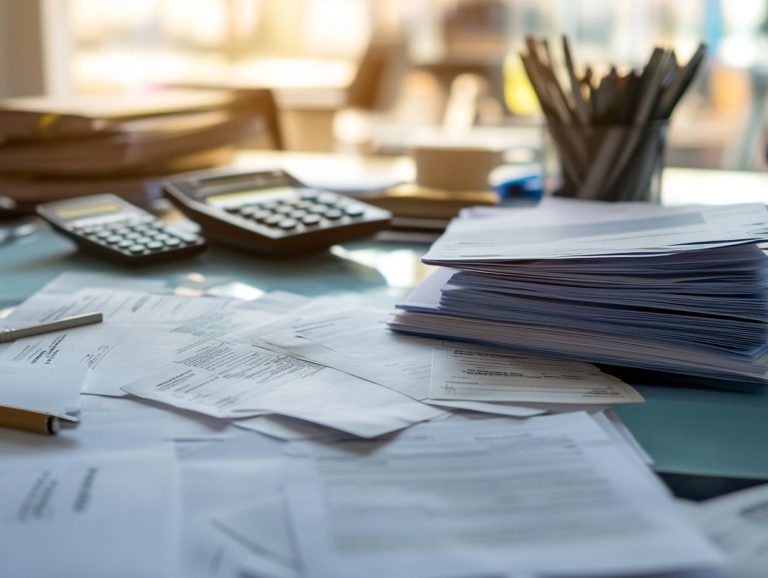The Tax Consequences of Trading Precious Metals
Investing in precious metals can be an exhilarating venture, but it also brings a distinct set of tax implications that you must grasp fully.
From the various types of metals, such as gold and silver, to the specific capital gains tax you might encounter, navigating this landscape is essential for your success.
This guide will walk you through crucial tax strategies, reporting requirements, and compliance tips. You’ll be well-equipped to minimize your tax liability while maximizing your investment returns.
Jump in and uncover the secrets of managing your tax strategies effectively!
Contents
- Key Takeaways:
- Understanding Precious Metals Trading
- Tax Implications of Precious Metals Trading
- Tax Strategies for Precious Metals Traders
- Tax Considerations for Different Types of Precious Metals
- Gold, Silver, Platinum, and Others
- International Tax Implications
- Staying Compliant with Tax Laws
- Frequently Asked Questions
- What are the tax consequences of trading precious metals?
- Do I have to pay taxes on my profits from trading precious metals?
- Are there any tax advantages to trading precious metals?
- Are there any deductions or credits available for trading precious metals?
- Do I have to report my precious metals trades on my tax return?
- What happens if I trade precious metals through a retirement account?
Key Takeaways:
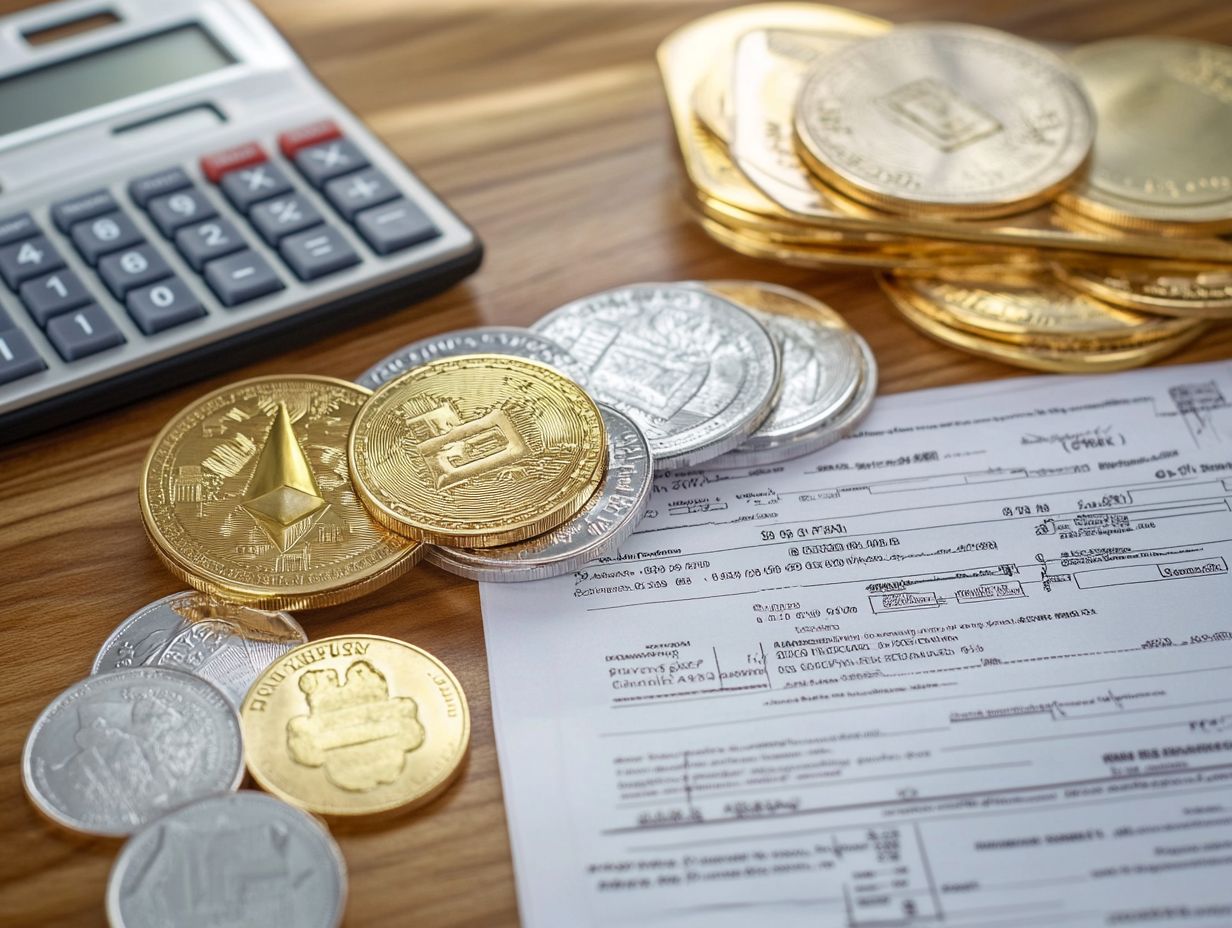
- Precious metals trading has significant tax implications, including capital gains tax and reporting requirements.
- Traders can minimize tax liability through strategic planning, accurate reporting, and diligent record-keeping.
- It’s important to understand the specific tax considerations for different types of precious metals and remain compliant with tax laws to avoid penalties.
Understanding Precious Metals Trading
Understanding precious metals trading is vital for you if you’re looking to diversify your investment portfolio and protect yourself against economic uncertainties.
This trading includes a range of assets, such as gold, silver, and platinum metals that have been cherished for centuries not just for their allure, but also for their investment potential.
As interest in precious metals continues to rise, it s essential for you to grasp the intricacies of trading these tangible assets and the significant role they play in effective wealth management.
Work with a financial advisor who has expertise in precious metals to refine your strategy for successful investing.
Types of Precious Metals
The primary types of precious metals you’ll encounter in the investment markets include gold, silver, and platinum. Each presents distinct opportunities and roles within your investment portfolio.
Investors like you often gravitate toward these metals not just for their intrinsic value, but also for their historical significance as safe-haven assets during times of economic uncertainty.
Gold, known for its wealth-preserving qualities, serves as a robust hedge against inflation and currency devaluation. Silver, with its ties to industrial applications, offers stability and growth potential in investments.
Platinum, though rarer, has unique industrial uses especially in automotive catalysis making it an intriguing option for anyone keen on understanding market dynamics.
Grasping the differences between tangible assets and exchange-traded funds (ETFs) is essential. Tangible assets grant you direct ownership and physical security, while ETFs provide liquidity and diversification in your trading strategies without the headaches of storage and insurance.
Tax Implications of Precious Metals Trading
The tax implications of trading precious metals are significant and complex. They impact how you manage your capital gains and overall tax liability. It’s essential for you to understand the various tax rates that apply to these metals, including the collectibles tax, to maximize your net investment income and minimize your exposure to ordinary income.
Being mindful of the specific tax consequences associated with buying, selling, and holding physical assets can greatly influence your wealth management strategy.
Start your precious metals trading journey today and secure your financial future!
Capital Gains Tax
Capital gains tax on precious metals trading significantly impacts you as an investor. It draws a distinct line between short-term and long-term gains based on how long you hold your assets.
This distinction carries profound implications for your overall investment strategy and financial well-being. Short-term capital gains, which apply to assets held for one year or less, are typically taxed at higher ordinary income tax rates. This can substantially erode your potential profits. Conversely, long-term capital gains benefit from reduced tax rates, encouraging you to hold onto your positions longer. This enhances your wealth accumulation prospects.
As a savvy investor, consider these tax implications when deciding the timing of your trades and how to structure your portfolio. This thoughtful approach ensures an effective wealth management strategy that aligns with your financial goals.
Reporting Requirements
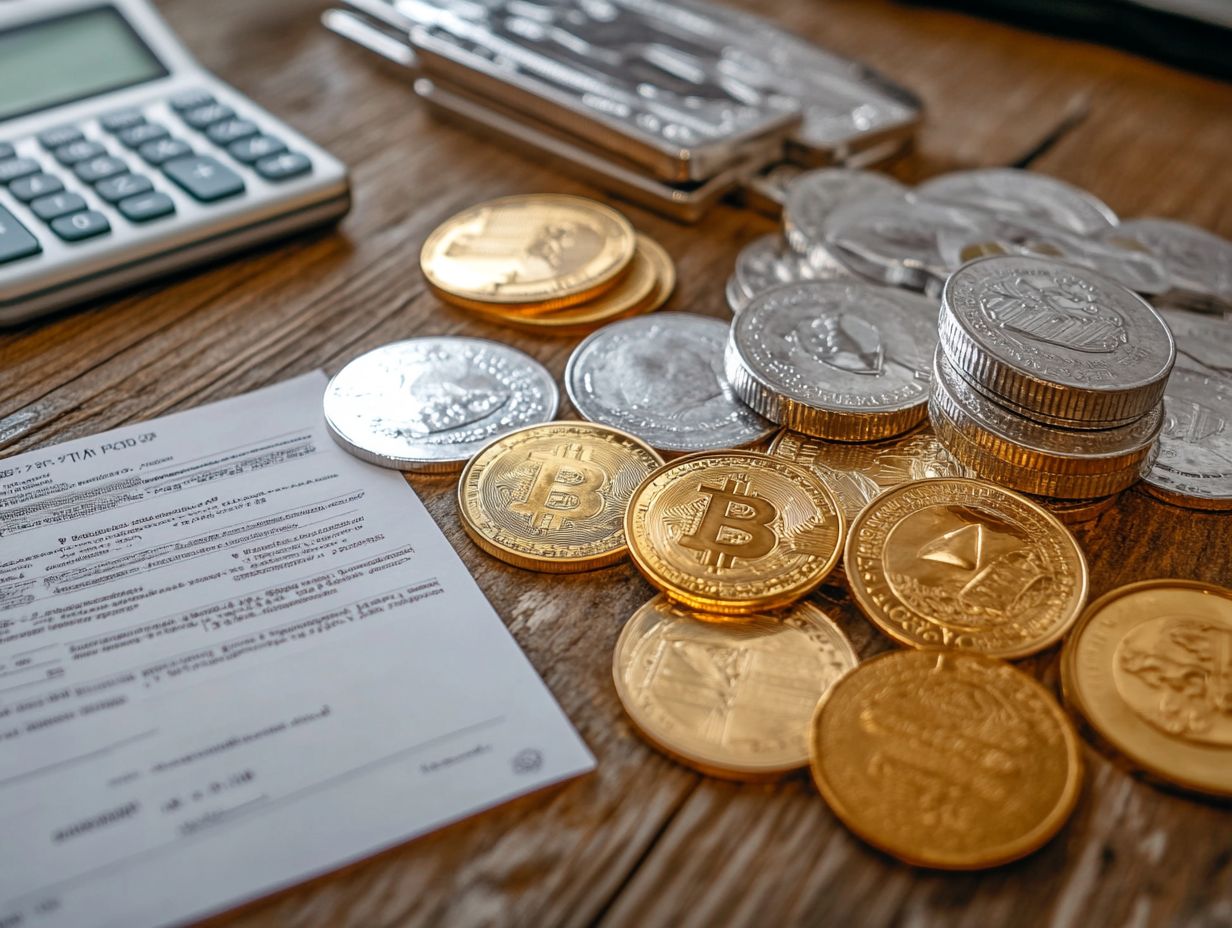
Proper tax reporting is essential for you as an investor in precious metals trading. This means accurately completing IRS forms, including Form 1099-B, to report your gains and losses.
These processes require careful record-keeping on your part to track every transaction accurately. Be sure to keep track of the purchase date, sale price, and type of metal. This will save you trouble down the line. Understanding the implications of capital gains tax is crucial, as the profits from your trades could be classified under short-term or long-term regulations. For a deeper insight, consider the understanding tax regulations for precious metals investors, depending on how long you hold the assets.
Compliance with IRS regulations not only helps you avoid potential audits but also ensures that you can take advantage of any applicable deductions or credits. By staying informed and organized, you can navigate this complex situation with confidence, maintaining transparency and accountability in your financial dealings.
Tax Strategies for Precious Metals Traders
Crafting effective tax strategies is crucial for you as a precious metals trader, especially if you want to minimize your tax liability while enhancing the performance of your investment portfolio.
Collaborating with a knowledgeable financial advisor can yield tailored strategies that align with your unique investment goals and wealth management practices.
Understanding capital gains is crucial; it gives you the power to make informed decisions that can significantly enhance your overall financial health.
Minimizing Tax Liability
Minimizing tax liability is essential for precious metals traders. You need to engage in strategic planning and develop a comprehensive understanding of capital gains to enhance your investment portfolio.
By incorporating specific strategies like tax-loss harvesting where you deliberately realize losses to offset gains you can effectively reduce your taxable income. Careful asset allocation is also crucial; diversifying your holdings creates opportunities for greater tax efficiency.
Timing your trades is equally important holding assets for over a year can allow you to benefit from lower long-term capital gains rates, significantly impacting your overall tax obligations.
Being proactive with your financial strategies is key to protecting your assets and boosting your returns in precious metals trading.
Tax Considerations for Different Types of Precious Metals
Tax considerations differ considerably based on the type of precious metals you re trading be it gold, silver, or platinum. Each metal carries its own unique tax implications that can significantly influence your investment portfolio.
Grasping these nuances is essential for you as an investor aiming to master the complexities of collectibles tax and maximize your returns. Understanding these distinctions will give you the power to refine your wealth management strategies while ensuring you remain compliant with pertinent tax regulations.
Gold, Silver, Platinum, and Others
Gold, silver, and platinum come with their own tax implications that are crucial for informed trading decisions and effective investment portfolio management.
Understanding these implications is key, as the tax treatment for different metals varies significantly based on factors like how long you hold them and the applicable capital gains rates. For instance, gold often serves as a hedge against inflation, while silver traders may encounter fluctuating market trends that affect selling prices and tax consequences of buying precious metals abroad.
Platinum, used in automotive and industrial applications, introduces its own market dynamics, adding complexity to tax considerations. By carefully reviewing the tax implications of precious metals trading linked to each metal, you can refine your trading strategies, optimizing financial outcomes while minimizing liabilities.
International Tax Implications

International tax implications significantly impact traders engaged in cross-border trading of precious metals. You must navigate intricate taxation regulations that vary by jurisdiction. Understanding these implications is essential for any investor eager to broaden their trading horizons globally.
Knowing international tax laws helps you avoid unexpected liabilities and enhances your overall investment performance.
Cross-Border Trading and Taxation
Engaging in cross-border trading of precious metals presents distinctive taxation challenges. You need to stay informed about the international tax implications that could impact your investment portfolio.
The complexities arise from varying regulations across different jurisdictions, which can lead to unexpected tax liabilities if not navigated carefully. Some countries impose capital gains tax on foreign assets, while others require specific reporting for offshore holdings. Additionally, consider the ramifications of double taxation treaties, which can alleviate certain liabilities but demand thorough documentation and compliance.
To manage your international investments effectively, incorporate strategic planning, such as utilizing tax-efficient structures and staying updated on regulatory changes. This proactive approach will help you optimize returns while minimizing unforeseen financial burdens.
Staying Compliant with Tax Laws
Staying compliant with tax laws is crucial for precious metals traders. Accurate reporting and diligent record-keeping can help you avoid costly penalties and facilitate seamless portfolio management.
By following best practices for compliance, you not only demonstrate ethical trading but also enhance tax efficiency. Adhering to established regulations can significantly influence your long-term wealth management strategy.
Tips for Accurate Reporting and Record-Keeping
Accurate reporting and diligent record-keeping are essential for traders in precious metals. This practice ensures compliance with tax laws and enhances effective investment portfolio management.
By establishing a systematic approach to documentation, you can improve your ability to track capital gains and losses. Utilizing spreadsheets and specialized software allows you to monitor each transaction comprehensively, streamlining processes during tax season.
Maintain detailed records of purchase dates, quantities, prices, and expenses associated with each trade. This level of detail fosters transparency and provides protection against potential audits, highlighting the necessity of robust reporting practices in precious metal investments.
Frequently Asked Questions
Want to enhance your investment strategy? Understanding tax implications in precious metal trading is essential for successful outcomes. Stay informed and consider consulting a tax advisor to navigate this complex landscape effectively.
What are the tax consequences of trading precious metals?
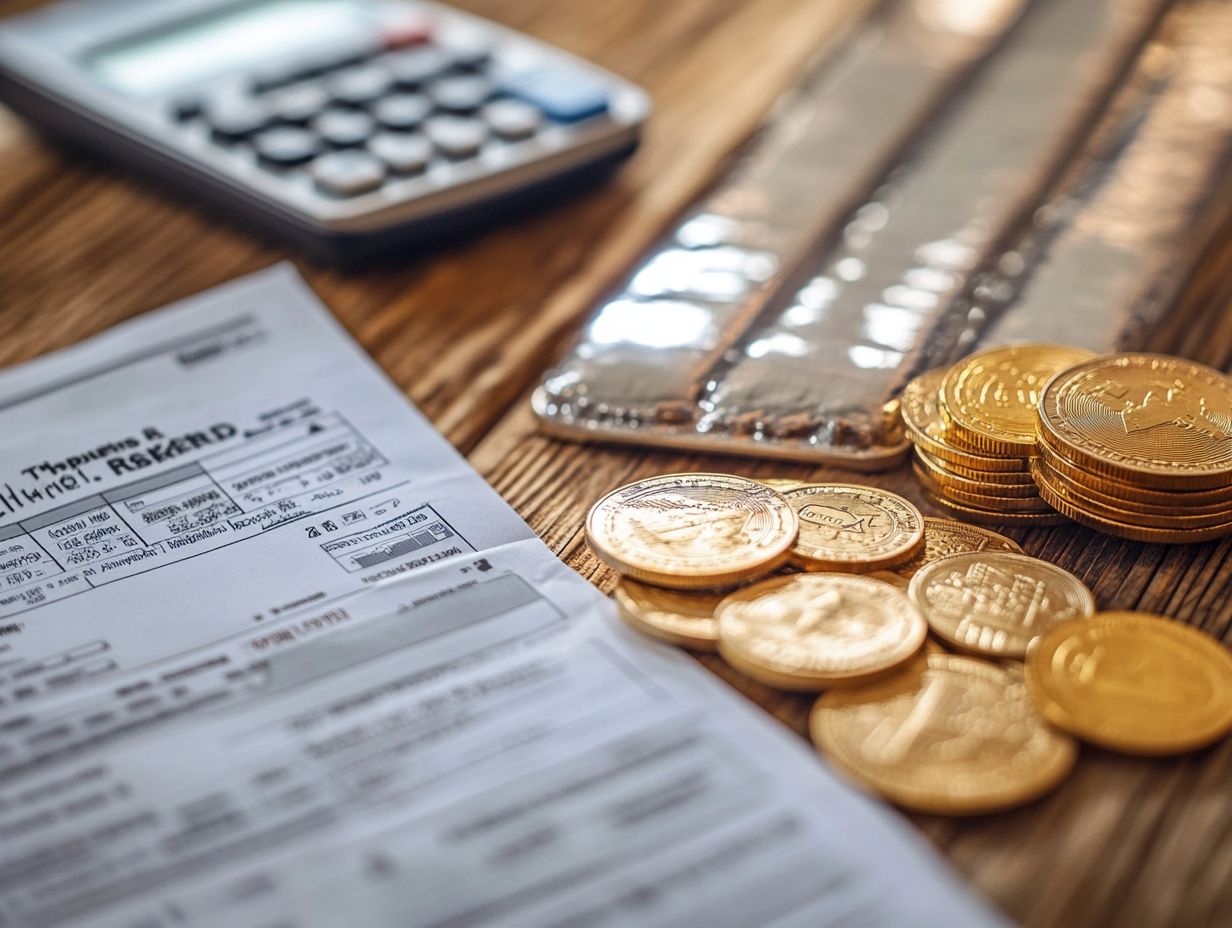
The tax consequences of trading precious metals depend on several factors. These include the type of metal, how long you held it, and the profit or loss from the trade.
Consulting with a tax advisor will help you understand the specific tax implications for your situation.
Do I have to pay taxes on my profits from trading precious metals?
Yes, profits from trading precious metals are subject to taxes on profits from selling an asset. The rate depends on your income level and how long you held the metal before selling it.
Short-term gains are taxed at your ordinary income tax rate. Long-term gains are taxed at a lower rate.
Are there any tax advantages to trading precious metals?
Yes! If you hold the metal for at least one year before selling, you may qualify for the lower tax rate on long-term profits.
Are there any deductions or credits available for trading precious metals?
There are no specific deductions or credits for trading precious metals. However, expenses related to the trade, like fees or commissions, may be deductible on your tax return.
Do I have to report my precious metals trades on my tax return?
Yes, you must report all income, including profits from trading precious metals, on your tax return each year. Don t overlook this! Failing to report your income can lead to serious penalties and interest from the IRS!
What happens if I trade precious metals through a retirement account?
If you trade precious metals through a retirement account, such as a traditional IRA or a 401(k), the tax consequences differ. Generally, any gains are tax-deferred until you withdraw from the account in retirement.










